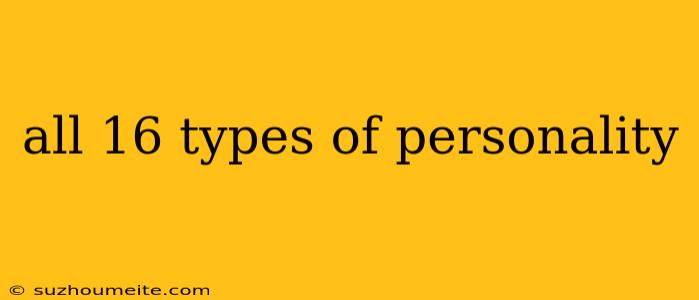The 16 Personality Types: A Comprehensive Guide
The Myers-Briggs Type Indicator (MBTI) is a popular personality assessment that categorizes individuals into 16 distinct personality types based on their preferences in four key areas:
1. Extraversion (E) vs. Introversion (I)
- Extraverts gain energy from interacting with others, prefer social situations, and tend to be outgoing and talkative.
- Introverts find their energy depleted by social interaction, prefer quiet time and solitude, and tend to be reserved and thoughtful.
2. Sensing (S) vs. Intuition (N)
- Sensing individuals focus on concrete details, facts, and practical experiences. They are realistic and grounded.
- Intuitive individuals are more interested in possibilities, patterns, and abstract ideas. They are imaginative and future-oriented.
3. Thinking (T) vs. Feeling (F)
- Thinking types make decisions based on logic, objectivity, and analysis. They value efficiency and fairness.
- Feeling types make decisions based on personal values, empathy, and relationships. They prioritize harmony and compassion.
4. Judging (J) vs. Perceiving (P)
- Judging individuals prefer structure and order. They like to make plans and decisions, and they enjoy completing tasks.
- Perceiving individuals are more flexible and adaptable. They prefer to keep their options open and are comfortable with spontaneity.
These four dimensions are combined to create 16 distinct personality types:
1. ISTJ - The Inspector
- Strengths: Responsible, practical, reliable, dedicated
- Weaknesses: Stubborn, inflexible, critical, overly cautious
2. ISFJ - The Protector
- Strengths: Loyal, kind, helpful, conscientious
- Weaknesses: Shy, overly sensitive, passive-aggressive, overly cautious
3. INFJ - The Advocate
- Strengths: Insightful, compassionate, principled, visionary
- Weaknesses: Idealistic, perfectionistic, sensitive, overly private
4. INTJ - The Architect
- Strengths: Strategic, independent, analytical, determined
- Weaknesses: Arrogant, aloof, insensitive, overly critical
5. ISTP - The Virtuoso
- Strengths: Practical, independent, resourceful, adaptable
- Weaknesses: Impulsive, reckless, detached, disorganised
6. ISFP - The Artist
- Strengths: Creative, gentle, compassionate, adaptable
- Weaknesses: Sensitive, indecisive, shy, avoiding conflict
7. INFP - The Mediator
- Strengths: Idealistic, compassionate, creative, empathetic
- Weaknesses: Overly sensitive, impractical, idealistic, indecisive
8. INTP - The Thinker
- Strengths: Logical, analytical, innovative, curious
- Weaknesses: Overly critical, detached, impractical, insensitive
9. ESTP - The Entrepreneur
- Strengths: Action-oriented, pragmatic, spontaneous, adaptable
- Weaknesses: Impulsive, reckless, insensitive, lack of follow-through
10. ESFP - The Entertainer
- Strengths: Charismatic, outgoing, spontaneous, adaptable
- Weaknesses: Impulsive, irresponsible, self-centered, shallow
11. ENFP - The Campaigner
- Strengths: Energetic, enthusiastic, imaginative, idealistic
- Weaknesses: Disorganized, scattered, impulsive, indecisive
12. ENTP - The Debater
- Strengths: Insightful, curious, witty, adaptable
- Weaknesses: Argumentative, impulsive, inconsistent, disorganised
13. ESTJ - The Supervisor
- Strengths: Efficient, practical, organized, responsible
- Weaknesses: Critical, inflexible, bossy, controlling
14. ESFJ - The Consul
- Strengths: Warm, friendly, helpful, responsible
- Weaknesses: Overly sensitive, controlling, overly cautious, gossip-prone
15. ENFJ - The Protagonist
- Strengths: Charismatic, inspirational, persuasive, empathetic
- Weaknesses: Overly sensitive, idealistic, controlling, perfectionistic
16. ENTJ - The Commander
- Strengths: Strategic, decisive, confident, results-oriented
- Weaknesses: Arrogant, demanding, impatient, controlling
Understanding your personality type can be valuable for:
- Self-awareness: Gaining a deeper understanding of your strengths, weaknesses, and preferences.
- Relationships: Improving communication and understanding in personal and professional relationships.
- Career choice: Identifying career paths that align with your natural talents and interests.
- Personal growth: Identifying areas for personal development and growth.
Remember:
- The MBTI is a tool, not a definitive label. It's a starting point for self-discovery and understanding.
- Your personality type can evolve and change over time.
- It's important to embrace your unique strengths and work on areas for improvement.
By exploring your personality type, you can gain valuable insights into yourself and how you interact with the world.
